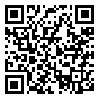Alireza Moumivand1 
 , Bahareh Tavakoli-Far1
, Bahareh Tavakoli-Far1 
 , Gelareh Vahabzadeh2
, Gelareh Vahabzadeh2 
 , Saeideh Momtaz3
, Saeideh Momtaz3 
 , Maliheh Farid1
, Maliheh Farid1 
 , Hosein Hosein Rafiemanesh1
, Hosein Hosein Rafiemanesh1 
 , Mahdi Goudarzvand *
, Mahdi Goudarzvand * 
 4
4

 , Bahareh Tavakoli-Far1
, Bahareh Tavakoli-Far1 
 , Gelareh Vahabzadeh2
, Gelareh Vahabzadeh2 
 , Saeideh Momtaz3
, Saeideh Momtaz3 
 , Maliheh Farid1
, Maliheh Farid1 
 , Hosein Hosein Rafiemanesh1
, Hosein Hosein Rafiemanesh1 
 , Mahdi Goudarzvand *
, Mahdi Goudarzvand * 
 4
4
1- Alborz University of Medical Sciences
2- Iran University of Medical Sciences
3- Institute of Medicinal Plants, ACECR
4- Alborz University of Medical Sciences ,m.godarzvand@abzums.ac.ir
2- Iran University of Medical Sciences
3- Institute of Medicinal Plants, ACECR
4- Alborz University of Medical Sciences ,
Abstract: (231 Views)
Introduction: Diabetes is one of the most common disorders of the endocrine glands, the main characteristic of which is an increase in the concentration of glucose in the serum of patients. Herbal medicines are widely accepted by people due to less side effects. The purpose of this study is to investigate the protective effect of the silybum marianum, melissa officinalis, vaccinium arctostaphylos, trigonella foenum, urtica dioica and citrullus colocynthis extracts mixtures in the PC12 cell model in a high glucose environment.
Methods and Methods: After 24, 48, and 72 hours of adding different concentrations of plant extracts (silybum marianum, melissa officinalis, vaccinium arctostaphylos, trigonella foenum, urtica dioica and citrullus colocynthis) in the normal culture medium of PC12 cells and the medium with high glucose (25 mg/ml, 13/5), cell viability was measured by MTT method.
Results: The results showed that the viability of PC12 cells did not change in 24, 48 and 72 hours after treatment with a mixture of plant extracts. The survival rate of cells in the high dose glucose group was significantly reduced compared to the control group, and the mixture of plant extracts in high doses significantly reduced cell death in these conditions.
Conclusion: Based on the available findings, glucose with a concentration of 25, 13.5 mg/ml caused the death of PC12 cells and the mixture of plant extracts was able to reduce the cell death caused by high glucose in all three times 24, 48 and 72 hours after exposure with nerve cells.
Methods and Methods: After 24, 48, and 72 hours of adding different concentrations of plant extracts (silybum marianum, melissa officinalis, vaccinium arctostaphylos, trigonella foenum, urtica dioica and citrullus colocynthis) in the normal culture medium of PC12 cells and the medium with high glucose (25 mg/ml, 13/5), cell viability was measured by MTT method.
Results: The results showed that the viability of PC12 cells did not change in 24, 48 and 72 hours after treatment with a mixture of plant extracts. The survival rate of cells in the high dose glucose group was significantly reduced compared to the control group, and the mixture of plant extracts in high doses significantly reduced cell death in these conditions.
Conclusion: Based on the available findings, glucose with a concentration of 25, 13.5 mg/ml caused the death of PC12 cells and the mixture of plant extracts was able to reduce the cell death caused by high glucose in all three times 24, 48 and 72 hours after exposure with nerve cells.
Send email to the article author
| Rights and permissions | |
 |
This work is licensed under a Creative Commons Attribution-NonCommercial 4.0 International License. |



